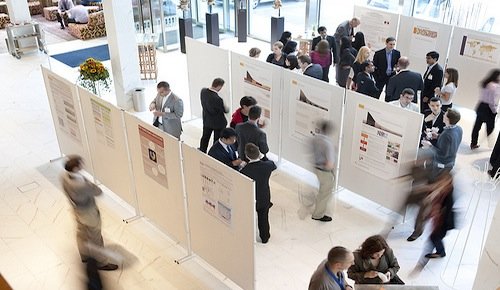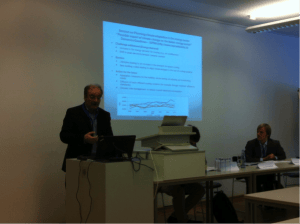
The first European Climate Change Adaptation Conference (ECCA, Hamburg, 18-20 March 2013) gathered about 700 international experts on adaptation practice and policy. Presence of PhD students was estimated around 200 participants.
The 2.5-day conference was structured in about 80 parallel sessions opened and closed by plenary sessions where latest research results, case studies as well as main scientific issues related to risks, uncertainties, costs and benefits, options and strategies were presented and discussed. Each session was characterized as pertaining more to the science or the practice side; however, sessions purposely designed for science‐practice interaction made researchers and practitioners work together on resolving a specific adaptation challenge. A poster session was also part of the conference programme.
The CMCC scientists participating at the Conference have been: Sergio Castellari (CMCC-SERC), Carlo Giupponi (CMCC-CIP) Sara Venturini (CMCC-SERC), and Dragana Bojovic (CMCC-CIP). Sergio Castellari was also member of the International Scientific Board of the Conference.
Sergio Castellari made the following presentations:
- “The National Adaptation Strategy in Italy: A work in progress”. Session: Transnational cooperation – Share information on climate adaptation on a European and transnational scale;
- “Hazard mitigation and climate change adaptation: an introduction”. Session: Mainstreaming climate adaptation – Tapping Other Resources: of Practise;
- “Italian approach to develop a National Adaptation Strategy: lessons learnt from other European efforts”. Session: Adaptation strategies and planning – On national, regional.
Carlo Giupponi made the following presentations:
- “Multi-agent integrated agro-economic simulation of irrigation water demand with climate services for adaptation and water saving”. Session: Decision-making under uncertainty – Local water management;
- “Stand alone and web based decision support systems for climate change adaptation: the ClimWatAdapt Project (Climate Adaptation – modelling water scenarios and sectoral impacts)”. Session: Role of tools and knowledge in adaptation – Broad scale tools;
- “Local development and climate change adaptation in the Alps: a case study on sustainable winter tourism in the Dolomites”. Session: Adaptation strategies and planning – Regional policies;
- “Experiences with interactive decision-support tools in water management” – Session: Role of tools and knowledge in adaptation – Science-practice lab for decision support: the practice of ‘serious gaming’.
Dragana Bojovic presented the following posters:
- “IWRM and eParticipation for Climate Change Adaptation in Rural Socioecosystems in Southern Europe”. Session: Adaptation strategies and planning
- “Changing pattern: eParticipation and online social networks in climate change adaptation decision-support” . Session: Role of tools and knowledge in adaptation
Regarding the Session Role of tools and knowledge in adaptation – Science-practice lab for decision support: the practice of ‘serious gaming’, after a brief introduction by Rob Swart (Alterra), Marjolijn Haasnoot (Alterra) conducted the practical session “Experiencing Serious Gaming” with all the participants, subdivided in groups around four tables.
Bert Hooijer (Rotterdam University of Applied Sciences) presented experiences of Delta Centres as a mechanism for combining science, education, policy and innovation. Furthermore, two presentations focused on decision problem, tools that are used, science-practice interactions, lessons learned, with a focus questions on “How did the tool contribute to effective science – practice linkages?”.
Speakers were Carlo Giupponi (Università Ca’ Foscari and CMCC) and Mark Stratton (UK Eastern Solent Coastal Partnership or representative DeltaNet).
The discussion focused on the problem that many tools are developed to support decision making under the uncertainty of climate change, but, when applying the tools in actual policy-making, several limitations are discovered (e.g. lack of data, different level of analysis, …). Participants agreed that the most appropriate tools are developed by a continuous dialogue between sciences and practitioners and by a recurrent process of testing and improving. Stimulating this dialogue should be the objective of a newly developed network of “science-practice labs” for a number of European regions vulnerable to climate change and sea level rise. As a spin-off, the session provided building blocks in developing the basis for a collaborative, policy-oriented research programme in the context of JPI Climate (transnational call).
Furthermore, on the 20th of March CMCC organized the session entitled “Role of tools and knowledge in adaptation ‐ Planning climate adaptation in the energy sector” moderated by Sergio Castellari.
Speakers included Giovanni Fini (“The Sustainable Energy Action Plan in Bologna”, City of Bologna, Italy); Jakob Wachsmuth (“Towards a Resilient Energy System in Northwestern Germany” – University of Bremen Research Center for Sustainability Studies, Germany); Domenico Gaudioso (“Possible impact of climate change on the Italian energy sector” – ISPRA, Italian National Institute for Environmental Protection and Research, Italy); and Jean Palutikof (“Energy as an overlooked reality of adaptation” – National Climate Change Adaptation Research Facility Griffith University, Gold Coast, Australia).
This session focused on the challenges and strategies to cope with the main expected effects of climate change in the energy sector that are related to decreasing demand for heating and increasing demand for cooling due to warmer temperatures, which in turn result in significant increases in electricity use and peak demand in most European regions; constraints to energy production due to rising temperatures and limited water supplies in many regions; consequences of exposure to sea-level rise and extreme weather events in the energy production and delivery systems in vulnerable regions; effects on some renewable energy sources, such as hydropower production in regions subject to changing patterns of precipitation or snowmelt.
The discussion highlighted the importance of integrating adaptation and mitigation in the energy discourse, especially in the context of national and regional strategies. According to the speakers, such integration must pass through the goal of energy efficiency, involving necessarily regional and local stakeholders. In fact, as happened in the cases of national, regional and local strategies under development in Italy and Germany, on one side it has been acknowledged that local policy-makers are not well aware of the problem of adaptation; on the other side, there is huge attention to the energy sector at that scale. As some examples showed it can prove to be really difficult to talk about long-term actions with stakeholders; most importantly there is need to develop a joint vision.
As a conclusion, there is agreement on the fact that adaptation to climate change in the energy sector means reducing the energy demand and increase efficiency, which will make the sector climate-proof. On the margin, there could be space to invest on psychology of climate change, in order to investigate the behaviours of stakeholders.
Other CMCC members who intervened during other conference sessions were: Carlo Giupponi, Giulia Galluccio, Sara Venturini.




